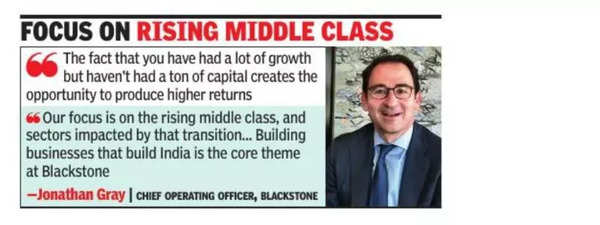Blackstone chief operating officer Jonathan Gray said here that India was the third biggest investment destination for Blackstone after the US and UK. “The fact that you have had a lot of growth but haven’t had a ton of capital creates the opportunity to produce higher returns,” he said.
The firm has been emboldened to make bigger investments on India as earlier bets have paid off. Also, with $200 billion of ‘dry powder’, the company sees India as a big opportunity considering the slowdown in advanced economies, global companies diversifying manufacturing, the developed equity markets which provide an exit route and the prospects of further reforms. “If you look at stock market returns over the last 10-20 years, the US has been number one in dollar terms, but India has been number two. India has become a place where more and more global investors are focused. It feels to me like the momentum is building, not slowing,” Gray added.

He said, “The big question mark investors had historically is: Could I get liquidity? The private market was pretty thin, particularly for large-sized assets. There was a bit of a leap of faith that you could exit through the public markets. That has paid off. I think that has really given global investors confidence that there’s liquidity on the other side.”
The $25 billion increase in asset value will include $17 billion in fresh investments and $7.5 billion from gains in its portfolio, with Blackstone bringing $2 billion of fresh capital every year, said Amit Dixit, the company’s India head.
“Our focus is on the rising middle class, and sectors impacted by that transition,” said Gray. “Building businesses that build India is the core theme at Blackstone,” he added.
Gray sees scope for reforms in the M&A space. “On the M&A front, in the US, 51% of the shareholders’ vote is required to buy a company and take it private, while in India, it is 90%. Some other countries are in between, so the threshold is much lower than 90%. When a company faces financial challenges, you want those companies to be able to exit the public markets and for that capital to be recycled in a rational way,” he said.
Similarly, in the US, a merger can be completed in several months as opposed to the several years it takes in India. Gray also feels that there is a need for synchronisation with the rest of the world when it comes to norms for Real Estate Investment Trusts to allow more investors and regulate it on a par with other investments.
The company, which is the country’s biggest landlord, has real estate portfolios in office space (Nucleus Office Parks), retail (Nexus Malls), logistics (Horizon Industrial Parks) and data centres (Lumina CloudInfra). In equity, Blackstone focuses on acquiring control and upgrading businesses. Recent highlights include acquiring CARE Hospitals (with KIMS HEALTH), building Sona Comstar into India’s largest EV auto components company with an IPO in 2021, transitioning IBS Software to a SaaS provider,and transforming Mphasis into a global cloud migration leader.

